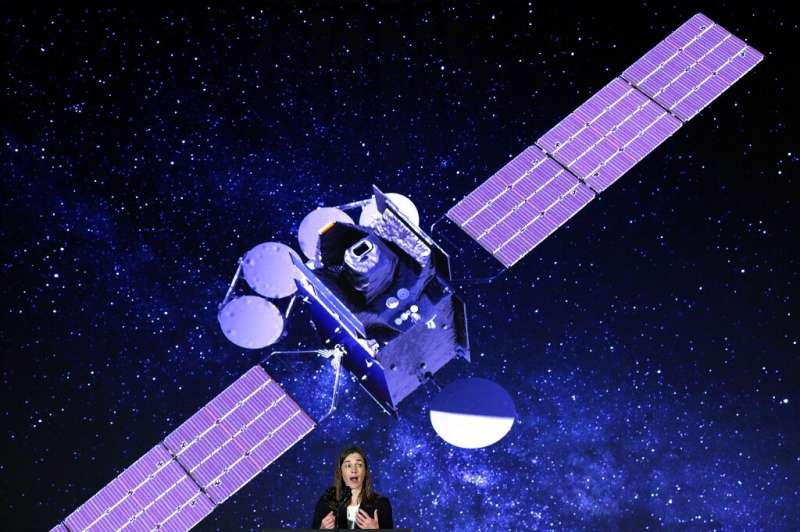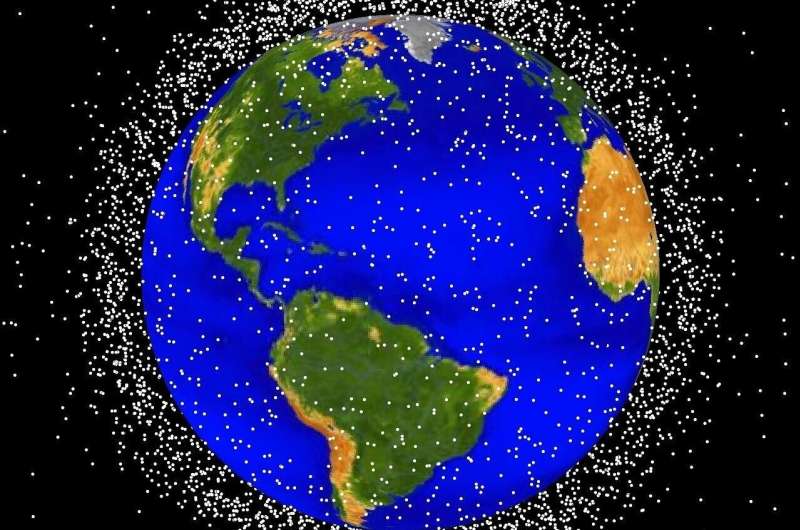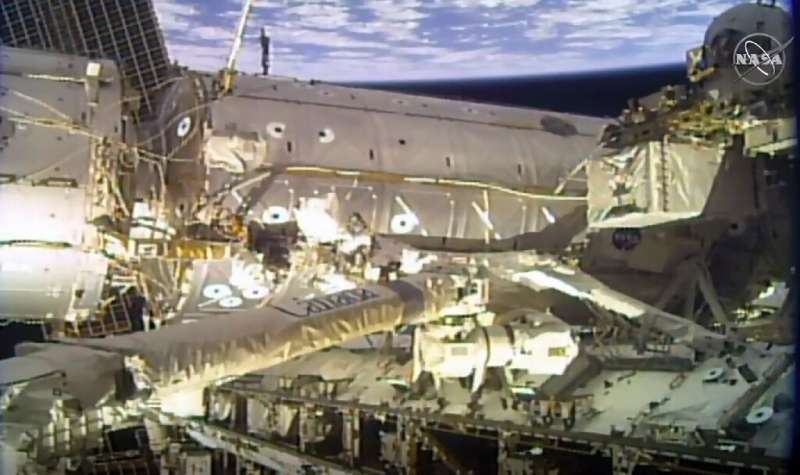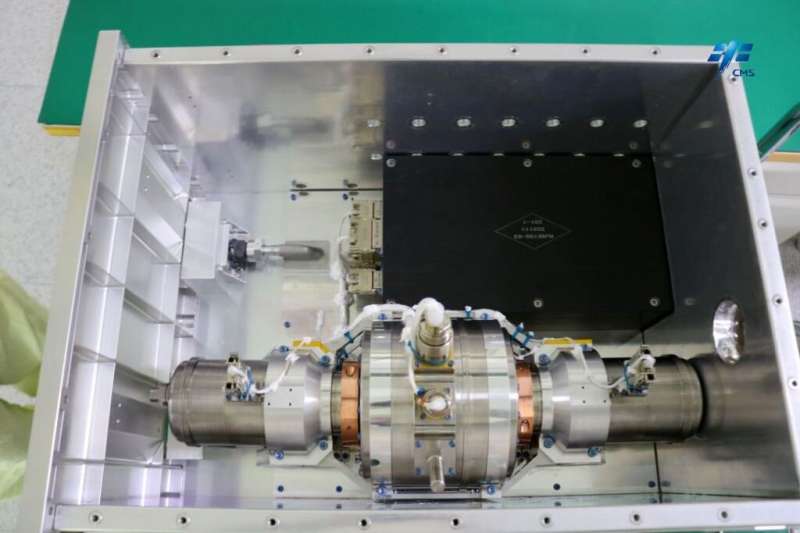
Copernical Team
Makenzie Lystrup named first female director of Goddard Space Flight Center
 Makenzie Lystrup has been named the first female director of the Goddard Space Flight Center in Maryland, NASA announced Thursday.
Lystrup will begin serving in the role immediately, succeeding Dave Mitchell, who has resumed his role as the chief program management officer at NASA's headquarters in Washington, D.C., NASA said in a news release.
"Goddard is an incredible center an
Makenzie Lystrup has been named the first female director of the Goddard Space Flight Center in Maryland, NASA announced Thursday.
Lystrup will begin serving in the role immediately, succeeding Dave Mitchell, who has resumed his role as the chief program management officer at NASA's headquarters in Washington, D.C., NASA said in a news release.
"Goddard is an incredible center an Earth from Space: Seoul, South Korea
 Image:
South Korea’s capital city, Seoul, and surroundings are featured in this image, captured by the Copernicus Sentinel-2 mission on 21 February 2023.
Image:
South Korea’s capital city, Seoul, and surroundings are featured in this image, captured by the Copernicus Sentinel-2 mission on 21 February 2023. Space-based NASA instrument to track pollution over North America

A Falcon 9 rocket successfully blasted off from Florida into space on Friday carrying a new NASA device that can track air pollution over North America down to the neighborhood level.
The launch, which took place at 12:30 am (0430 GMT), will bring into orbit the Tropospheric Emissions Monitoring of Pollution (TEMPO) instrument, which will allow scientists to monitor air pollutants and their emission sources more extensively than ever before.
The data will be used by the US Environmental Protection Agency, the National Oceanic and Atmospheric Administration and other agencies responsible for tackling atmospheric pollution.
Revealing invisible Himalaya glacier loss

New research reveals that ice being lost from glaciers that flow into lakes in the Himalayas has been significantly underestimated. This discovery has critical implications for predicting the demise of the region’s glaciers and for managing critical water resources.
Soyuz spacecraft that will bring ISS crew back to Earth moved to new port
 The Soyuz MS-23 spacecraft that will return three International Space Station crew members to Earth moved to a new docking port on the space station Thursday.
The three Expedition 69 crew members - NASA astronaut Frank Rubio and Roscosmos cosmonauts Sergey Prokopyev and Dmitri Petelin - successfully moved the spacecraft to the Prichal module on the Earth-facing side of the ISS at 5:22
The Soyuz MS-23 spacecraft that will return three International Space Station crew members to Earth moved to a new docking port on the space station Thursday.
The three Expedition 69 crew members - NASA astronaut Frank Rubio and Roscosmos cosmonauts Sergey Prokopyev and Dmitri Petelin - successfully moved the spacecraft to the Prichal module on the Earth-facing side of the ISS at 5:22 Axiom Space's upcoming ISS mission part of increasing commercialization of space
 NASA and Axiom Space announced the first possible launch date of the commercial Ax-2 Mission to the International Space Station on Thursday.
The SpaceX CRS-27 Dragon spacecraft is slated to launch from Launch Complex 39A at Kennedy Space Center in Florida on May 8 at 10:43 p.m. EST. Axiom Space hosted a mission overview press conference on Thursday to discuss the status of the mission.
NASA and Axiom Space announced the first possible launch date of the commercial Ax-2 Mission to the International Space Station on Thursday.
The SpaceX CRS-27 Dragon spacecraft is slated to launch from Launch Complex 39A at Kennedy Space Center in Florida on May 8 at 10:43 p.m. EST. Axiom Space hosted a mission overview press conference on Thursday to discuss the status of the mission. SpaceX prepares for rehearsal, test flight of Starship rocket
 SpaceX plans to carry out a launch rehearsal next week of Starship, the most powerful rocket ever built, and its first test flight possibly the following week, the private space company said Thursday.
SpaceX published photos of the massive Starship, which is designed to eventually send astronauts to the Moon and beyond, on its launchpad at the company's base in Texas.
"Starship fully sta
SpaceX plans to carry out a launch rehearsal next week of Starship, the most powerful rocket ever built, and its first test flight possibly the following week, the private space company said Thursday.
SpaceX published photos of the massive Starship, which is designed to eventually send astronauts to the Moon and beyond, on its launchpad at the company's base in Texas.
"Starship fully sta How can we make the space sector more sustainable?

When talking about space, one might think about the stars one sees at night or a good sci-fi film. But space is also crowded with satellites, spacecrafts and astronauts, whose missions can last anywhere from several days to months. Meanwhile, 8,216 unmanned satellites revolve around Earth's orbits to improve our daily lives. Communication satellites contribute to enhancing Internet access in regions deprived of infrastructure (so-called "white areas"); meteorology satellites have become essential for weather forecasts, while navigation satellites (including GPS) are crucial for current and future transportation needs such as automatic driving vehicles.
Technological advances in the sector have unlocked many new business opportunities. The industry can now launch constellations of thousand satellites to reach corners of the earth as it had never before (e.g., Starlink), while new markets such as space mining and space tourism are steadily growing. National champions (including the United States and France) have also framed the space sector as a top economic priority. It is thought the technological benefits accrued by companies such as SpaceX, Blue Origin or OneWeb, launched by billionaires such as Elon Musk, will also be able to trickle down to non-space sectors such as the energy or freight industries.
May 8 launch for private mission to ISS with Saudi astronauts

Two astronauts from Saudi Arabia, including the first Saudi woman, will blast off from Florida on May 8 on a private mission to the International Space Station (ISS), Axiom Space and NASA officials said Thursday.
Rayyanah Barnawi, a breast cancer researcher, will become the first Saudi woman to voyage into space and will be joined on the mission by fellow Saudi Ali Al-Qarni, a fighter pilot.
Also on board will be Peggy Whitson, a former NASA astronaut who will be making her fourth flight to the ISS, and John Shoffner, a businessman from Tennessee who will serve as pilot.
China tests a Stirling engine in orbit

The China National Space Agency (CNSA) has made considerable progress in recent years with the development of its Long March 5 (CZ-5) rocket and the completion of its Tiangong-3 space station. The agency also turned heads when it announced plans in June 2021 to create an International Lunar Research Station (ILRS) that would rival the Artemis Program. On top of all that, China upped the ante when it announced later that month that it also had plans to send crewed missions to Mars by 2033, concurrent with NASA's plans.
As part of their growing efforts to become a major power in space, which includes human exploration, China recently announced the completion of the first in-orbit test of a Stirling thermoelectric converter. The Shenzou-15 mission crew performed the test aboard Tiangong-3, and it was the first successful verification of the technology in space. This technology is also being investigated by NASA and is considered a technological solution to the challenges of space exploration, especially where long-duration stays and missions to locations in deep space are concerned.
